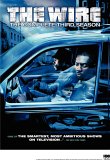| Reviews & Columns |
|
Reviews DVD TV on DVD Blu-ray 4K UHD International DVDs In Theaters Reviews by Studio Video Games Features Collector Series DVDs Easter Egg Database Interviews DVD Talk Radio Feature Articles Columns Anime Talk DVD Savant Horror DVDs The M.O.D. Squad Art House HD Talk Silent DVD
|
DVD Talk Forum |
|
|
| Resources |
|
DVD Price Search Customer Service #'s RCE Info Links |
|
Columns
|
|
|
Wire - The Complete Third Season, The
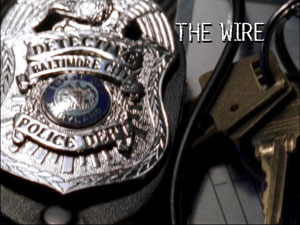
INTRODUCTION:
The Wire is the best show on television. Period. If you've seen the show, you don't need me to tell you this, but for those who may have stumbled onto this review not knowing what to expect, I want to make this as clear as possible from the start: The Wire is the best show on television, and if you haven't been watching it, you're missing out on one incredible experience. Moreover, its third season, presented here in yet another fantastic HBO release, is arguably the show's finest effort to date. Building on everything that came before, this third season takes a more cerebral approach to the war between law enforcement and drug dealers, posing difficult moral dilemmas and facing head-on the near futility of this destructive social struggle. It is deliberate, it is thought-provoking, it is powerful, and it is not to be missed.
N.B.: This review assumes the reader knows the events that took place in the first two seasons of The Wire. If you are not familiar with them, you really should check them out before continuing. Seasons 1 [review] and 2 [review] are currently available on DVD.
CONTENT:
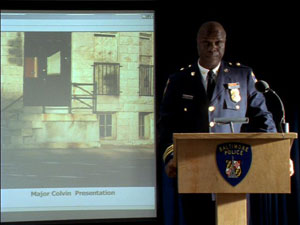 Season 3 begins about six months after the Port Authority case concluded the previous season. Having successfully closed out the 14 bodies from the shipping container, Lt. Daniels (Lance Reddick) is now in charge of a stable Major Cases Unit and is currently tracking the movements of "Proposition Joe" (Robert F. Chew) and his crew, now linked to the smuggling ring at the docks. Unfortunately, while the detail finally has some support and legitimacy, their wire taps are proving ineffective, and they can't even get to Joe's nephew lieutenant "Cheese" (Method Man), let alone the Eastside kingpin himself. The dealers have gotten smarter, phone conversations are coded and infrequent, and power players are almost completely removed from the primary loop. Much of this is due to the fallout from the Avon Barksdale (Wood Harris) case and the growing influence of his ever self-improving second-in-command "Stringer" Bell (Idris Elba).
Season 3 begins about six months after the Port Authority case concluded the previous season. Having successfully closed out the 14 bodies from the shipping container, Lt. Daniels (Lance Reddick) is now in charge of a stable Major Cases Unit and is currently tracking the movements of "Proposition Joe" (Robert F. Chew) and his crew, now linked to the smuggling ring at the docks. Unfortunately, while the detail finally has some support and legitimacy, their wire taps are proving ineffective, and they can't even get to Joe's nephew lieutenant "Cheese" (Method Man), let alone the Eastside kingpin himself. The dealers have gotten smarter, phone conversations are coded and infrequent, and power players are almost completely removed from the primary loop. Much of this is due to the fallout from the Avon Barksdale (Wood Harris) case and the growing influence of his ever self-improving second-in-command "Stringer" Bell (Idris Elba).
Avon's crew on the Westside is even more elusive. With the influx of Prop Joe's high quality product and the business savvy of Stringer Bell, Westside dealers are now heavily organized, sharing product, settling disputes in peaceful face-to-face meetings, and turning more profit than any of them has ever seen. This new sense of teamwork between rivals is maintaining structure and consistency on the streets, but most importantly, it's keeping the violence to a minimum, and with crime up all over the city and the Mayor (Glynn Turman) looking to reelection, Commissioner Burrell (Frankie Faison) isn't interested in expending manpower and resources to catch drug dealers who aren't dropping bodies. He needs the murder rate to go down, and in order to accomplish that, the Major Cases Unit's focus is turned away from Barksdale's crew and onto less influential drug runners too foolish to avoid killing one another. McNulty (Dominic West), however, has other ideas and is not ready to let go of his great white whale just yet.
With the pressure from the Mayor being felt through all levels of law enforcement, new Deputy Commissioner Rawls (John Doman) is hounding his district commanders at COMSTAT meetings, demanding they get their crime rates down or face significant consequences. In response, detectives are being encouraged to manipulate crime reports in a way that makes it appear that crime has gone down, when in reality all that has changed is the classification. With creative reporting, murders become assaults, robberies become larcenies, and the Mayor gets his drop in crime. Western district commander Major "Bunny" Colvin (Robert Wisdom), however, refuses to go along with this sham, instead opting for a drastic and controversial solution to the drug violence that is destroying his community. Six months away from his 30th year and a secured pension, he is emboldened to take a chance on an idea he's had for some time. Since most of the violence in his district is caused by the fallout from the drug war, and the rest of it can't be properly investigated because too many officers are tracking smalltime dealers, what would happen if he could redirect all the drug traffic to a few abandoned areas of the city? By instructing his officers not to patrol certain unpopulated sectors and informing the mid-level dealers that this "look the other way" behavior was going on, could he drive the drug game away from heavily populated areas and, in effect, save his district by giving in to its greatest flaw? The Wire's third season boldly endeavors to answer that question, taking us through the good and the ugly of this radical concept, and it makes for some of the most thoughtful and compelling analysis of crime ever put on film.
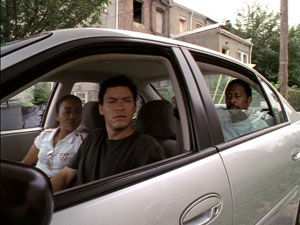 What works to perfection is that, like most things in The Wire, the writers do not attempt to glorify the circumstances. We all know that the "War on Drugs" isn't working, and while that is fundamental aspect of this season, there is no grand political statement being made, no clear "solution" to the problem being proposed. The Wire simply shows us the realities of this growing malady, from all angles and perspectives, and with a dramatic truth too profound to be ignored. As the architect of this dangerous scheme, Colvin carries the weight of the world on his shoulders, and Robert Wisdom infuses the character with so much warmth of heart and internal struggle that he makes for an incredible addition to the cast. He is but one of many new characters, though, and only The Wire would have the courage to take a cast of some 40 major individuals and add 10 more to the mix.
What works to perfection is that, like most things in The Wire, the writers do not attempt to glorify the circumstances. We all know that the "War on Drugs" isn't working, and while that is fundamental aspect of this season, there is no grand political statement being made, no clear "solution" to the problem being proposed. The Wire simply shows us the realities of this growing malady, from all angles and perspectives, and with a dramatic truth too profound to be ignored. As the architect of this dangerous scheme, Colvin carries the weight of the world on his shoulders, and Robert Wisdom infuses the character with so much warmth of heart and internal struggle that he makes for an incredible addition to the cast. He is but one of many new characters, though, and only The Wire would have the courage to take a cast of some 40 major individuals and add 10 more to the mix.
On the political side, Season 3 focuses not just on the Mayor himself but the City Councilmen who are after his job, chiefly Thomas Carcetti (Aidan Gillen) and Anthony Gray (Christopher Mann). These two men are honorable individuals for the most part, genuinely looking to make Baltimore a better place, but they cannot hide from the political game that must be played in order to make a difference. On the streets, a new player is emerging by the name of Marlo Stanfield (Jamie Hector). While Stringer, Prop Joe, and most of the other dealers have organized themselves into a mutually beneficial relationship, Marlo is keen on protecting his territory and is more than capable of causing trouble for anyone who gets in his way. A calm, decisive, and perceptive leader, Marlo presents serious problems for both the Barksdale crew and the Police Department. He makes for a great new addition to an already stellar cast, and Hector's understated performance provides a disturbing undertone to the character and the future of the drug trade in Baltimore.
Also understated is the work of another new addition to the show named Cutty (Chad Coleman). Cutty's a loyal soldier in the Barksdale crew, or at least he was until he served a 14-year stretch in prison. Now he's on the outside, searching for a way to survive in a world that has passed him by. His struggle to find himself is a subplot that occurs tangentially to the primary stories of this season, but it is one of the show's most effective elements. We've seen how this lifestyle affects the police, the dealers, and their families, but Cutty gives us a glimpse into a man trying to find a second chance, trying to make something of a life half-wasted behind bars. It's that subtle touch, that extra time spent on a seemingly nonessential addition to the cast that separates this show from nearly everything else on television. His story is important to tell and powerful to observe, and it is woven into the fabric of the season very effectively.
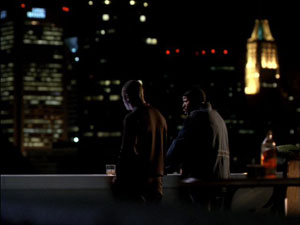 Amazingly, with so many wonderful new characters, the primary cast still continues to shine. Herc (Domenick Lombardozzi) and Carver (Seth Gilliam), insulted by their lack of responsibility in the Port Authority case, are now busting heads in the Western district with Major Colvin. As always, they have yet to heed Kima's (Sonja Sohn) wisdom: "Police is only as good as his informants." Kima herself is entrenched within the Major Cases Unit, working side-by-side with McNulty and becoming more like him with each passing day, while Jimmy tries desperately to learn from his mistakes and save himself from his own destruction. Bubbs (Andre Royo) and Johnny (Leo Fitzpatrick) are up to their old tricks, scamming for dope and playing both sides of the field, and Bodie's (JD Williams) still running his corners, making every effort to give Stringer what he wants, but never clearly understanding exactly what he's supposed to do. And of course, there's always Omar (Michael K. Williams), the near mythic figure lurking in the shadows with a shotgun in his hand and a whistle on his lips. After Stringer conned him into going after Brother Mouzone (Michael Potts), Omar is a man on a mission, putting himself and his team in harm's way just to stick it to the Barksdale crew whenever and wherever he can.
Amazingly, with so many wonderful new characters, the primary cast still continues to shine. Herc (Domenick Lombardozzi) and Carver (Seth Gilliam), insulted by their lack of responsibility in the Port Authority case, are now busting heads in the Western district with Major Colvin. As always, they have yet to heed Kima's (Sonja Sohn) wisdom: "Police is only as good as his informants." Kima herself is entrenched within the Major Cases Unit, working side-by-side with McNulty and becoming more like him with each passing day, while Jimmy tries desperately to learn from his mistakes and save himself from his own destruction. Bubbs (Andre Royo) and Johnny (Leo Fitzpatrick) are up to their old tricks, scamming for dope and playing both sides of the field, and Bodie's (JD Williams) still running his corners, making every effort to give Stringer what he wants, but never clearly understanding exactly what he's supposed to do. And of course, there's always Omar (Michael K. Williams), the near mythic figure lurking in the shadows with a shotgun in his hand and a whistle on his lips. After Stringer conned him into going after Brother Mouzone (Michael Potts), Omar is a man on a mission, putting himself and his team in harm's way just to stick it to the Barksdale crew whenever and wherever he can.
With all of that going on, however, the true gem of this season is the relationship between Avon and Stringer. Stringer Bell is consistently one of the most intriguing characters on television, and this third season really puts him to the test. Removing himself further and further from the ground-level operations of his drug trade, he is now running B&B Enterprises (Barksdale & Bell), a semi-legitimate business looking to be a player in, among other things, the real estate game. What Bell finds, though, is that the suits may have changed, but the corruption is largely the same, and politicking his way through the corporate minefield proves far more difficult than he anticipated. Making matters worse, his figurative brother and lifelong friend Avon is about to be released back into society, following the reduced sentence gained after exposing the drug-running prison guard last season. While Stringer wants to polish himself up and pass for a respectable businessman, Avon's heart only knows the respect of the street, and his return threatens to undermine everything Bell has worked for all this time.
It is difficult to fathom that there are only 12 hours of content in this season. With so many great characters all involved in a wealth of story, it is a remarkable accomplishment that it all comes together in the end with such coherency and effectiveness. No character is superfluous, and no energy is wasted. It is all necessary, and it weaves together in one of the most impressive seasons of television I have seen in a long time. The Wire's first season took us deep into the mechanics of the drug trade and the police wires intended to stop them, showing us both sides of the equation with equal measure. The second season gave us smuggling operations, union machinations, and examined the struggles of the American working class. Both of these seasons were excellent television, and yet somehow, the sum total of this third season is even better. The day-to-day operations of the drug trade are still there, the bureaucratic and political struggles of law enforcement are still there, but what has been added -- or more appropriately, what has been enhanced -- is the soul of the show. What began as a compelling interplay between police and drug dealers has graduated into something much greater, a soul-searching quest for reform that takes shape as McNulty tries to fix his life, Stringer endeavors to legitimize his business, Cutty attempts to go straight, and Colvin aims to save the entire city from itself. The Wire's third season is so much more than the sum of its parts, and it is one of those really special seasons of television that works on many different layers and demands repeat viewing. Of the three seasons so far, it takes the longest to ramp up, but its goals are by far the most lofty, and I cannot overstate how effectively it achieves them.
PRESENTATION:
Much like the first two seasons, "The Wire - The Complete Third Season" is presented in a sturdy case where the top cover opens counter-clockwise on a hinge to reveal a single art panel and five plastic disc-holding pages. The main cover art and panel design present a nice creative duality, and they serve to make the packaging just a little bit nicer than your average set. Unlike the other seasons, the pages are now clear plastic, and episodic descriptions have been moved to the side panels. The photo array of the various characters has been removed.
The series is presented visually in full frame 4:3 as it originally aired, and it looks very good. The Wire often has a very dark palette, with all the nighttime alleys and abandoned buildings, and those colors come through quite well in this release. Episodes are structured with no more than 3 on a disc, so defects in the DVD authoring are difficult to detect, and with the exception of some minor aliasing, and a few glitches in the credits, the video looks about as good as it possibly could.
In terms of audio, English 5.1 is offered, as well as English, French, and Spanish 2.0. As one would expect with an HBO release, it sounds excellent. There is quite a lot of sound variety in this show, and it all comes through clear with effective use of the surround channels. Action sequences flow nicely with the softer dialogue pieces, and levels are balanced precisely where you would want them to be. Subtitles are provided in English, French, and Spanish.
My only real complaint about this release (and the others) is that there are no chapter stops after each episode's title sequence.
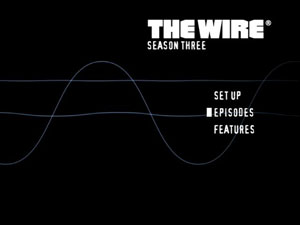
WHISTLES & BELLS:
HBO has really been making an effort lately to increase the bonus features on their releases, and it shows again with this third season release of The Wire. Included here are 5 audio commentaries with writers, directors, and producers (the first 3 and last 2 episodes), a nice increase over the 2 from the previous release. While none of them stands out as overly exciting, and there is a decent amount of dead time in each, quite a bit of creative insight can be found here, particularly from creator David Simon, who contributes on 3 episodes. These speakers may not be the most engaging personalities, but it is abundantly clear that they know what they're doing with this show and have given a great deal of thought to every single detail.
Also included is a full hour of material from a Museum of Television & Radio Q&A session with writers and producers David Simon, Ed Burns, George Pelecanos, Karen L. Thorson and stars John Doman (William Rawls), Idris Elba (Stringer Bell), Seth Gilliam (Ellis Carver), and Jamie Hector (Marlo Stanfield). Ken Tucker, film critic for New York Magazine, moderates the event, and while he is an effective writer, he's a pretty awkward speaker, frequently burying his head in his notes and stumbling over his words. However, once you get past this -- and the poor audio/video quality -- you find there is a great deal of information exchanged between the panel and audience. It is a very solid inclusion for any fan of the series.
"Politics, Journalism and Commercial Art: A Master Class on HBO's The Wire" is about 30 more minutes of Q&A, this time only with David Simon at Eugene Lang College. There is some repeated material here, but certainly a lot of additional behind-the-scenes information about the series and the creative process. Of note, a lot of the material here is analysis of another David Simon project for HBO called The Corner [review].
Finally, on each disc is a series of organizational charts that detail who all the key players are and how they are connected to one another, and on the first disc is another creative ad in the "It's Not TV. It's HBO." campaign, this time set against Tracy Chapman's "Change".
CONCLUDING THOUGHTS:
I recognize the boldness of the statement, and yet I cannot shy away from my belief in its accuracy. The Wire is the best show on television, and with each passing episode, I find myself more in awe of its staggering quality and appreciative that the writers have so much faith in the viewer to deliver something with such complexity and depth. The numerous characters are all compelling, and the writing flows with a level of perceptive intelligence that is unmatched in the current television landscape. On the surface, The Wire weaves together a fascinatingly intricate and sophisticated tale of inner-city crime, all the while building layer upon layer of symbolism and metaphor that reward the attentive viewer and demand repeated examination. It truly is a glorious achievement, and I can only hope that in time more people find a way to see this amazing program. DVD Talk Collector Series.
|
| Popular Reviews |
| Sponsored Links |
|
|
| Sponsored Links |
|
|
| Release List | Reviews | Shop | Newsletter | Forum | DVD Giveaways | Blu-Ray | Advertise |
|
Copyright 2024 DVDTalk.com All Rights Reserved. Legal Info, Privacy Policy, Terms of Use,
Manage Preferences,
Your Privacy Choices | |||||||









